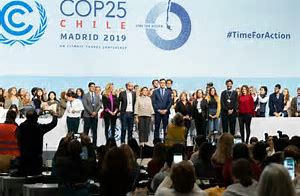
Once again, despite negotiations lasting 16 days at the UN’s recently concluded COP25 climate summit in Madrid, and despite urging from the United Nations and civil society groups to address the climate emergency with “ambition,” government representatives could only come up with a weak call on parties to be more ambitious in their 2020 climate commitments, which under the Paris accord must be submitted before next year’s COP26 in Glasgow, Scotland. The conference failed to find common ground on international carbon trading rules, the key issue to be addressed at the Conference.
The landmark 2015 Paris Agreement calls on countries to cut their greenhouse gas emissions to ensure that global temperatures do not rise by more than 2°C by the end of this century while attempting to contain warming at 1.5°C above pre-industrial levels. During COP25, the World Meteorological Organization announced that the global average temperature reached 1.1°C above pre-industrial levels in 2019, concluding a decade of exceptional global heat.
The conference ended with a declaration on the “urgent need” to close the gap between existing emissions pledges and the temperature goals of the Paris agreement, but once again progress towards meaningful action was blocked led by countries such as the US, Brazil and China as well as major fossil fuel exporters Australia and Saudi Arabia. Current policies are predicted to result in a temperature rise of 2.8 – 3.2 C by the end of the century.
Speaking following the conclusion of the conference UN Secretary General Antonio Guterres expressed his frustration. “I am disappointed with the results of COP25” he said, “the international community lost an important opportunity to show increased ambition on mitigation, adaptation and finance to tackle the climate crisis”. He went on to say “But we must not give up, and I will not give up. I am more determined than ever to work for 2020 to be the year in which all countries commit to do what science tells us is necessary to reach carbon neutrality in 2050 and a no more than 1.5 degree temperature rise.”